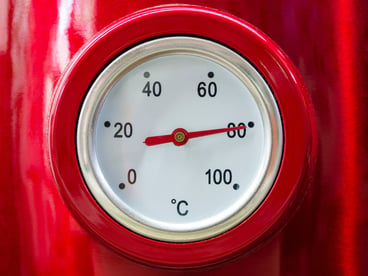A hot water heat pump is a big deal. It can give substantial savings compared to a traditional electric system, with some so efficient that they can give up to an 80% reduction in your hot water bill. Rebates mean you can make it an even better deal, shaving money off your install cost.
Some companies even offer a heat pump upgrade for free. They can do this by offering a cheap product and claiming enough from rebates to not just break even, but make a profit. At G Store, we’ve chosen not to do that. In this article, we explain the reasons why we steer away from low end offerings.
Free heat pumps are less efficient
A top of the line heat pump that’ll last for decades and shave the most off your hot water bill will cost around $5000. Rebates can be substantial, but they’re not enough to bring that down to zero – a free heat pump has to be a cheaper product. Cheaper doesn’t always mean worse, but with these systems, you can’t bring the price down that much without making sacrifices on build quality and compromises on environmental impact.
One big sacrifice is the efficiency. These systems might perform adequately on a hot day when there’s plenty of ambient heat, but you could see them start to struggle as it gets colder – and those winter days are when you’ll feel a lack of hot water the hardest!
If you’re upgrading an electric hot water system to a heat pump, you’ll see savings. It’s a just a question of how much. The best heat pumps are capable of, on average, turning 1kW of electricity into 5kW of heating power. Cheaper systems will average 1kW into 2-4kW of heating power – that difference stacks up over the years. You’ll save money initially, but in the long run you’re always better off with a heat pump which will run more efficiently each day and in turn add up over the years to put you well in front.
We’ll go into this in more detail later, but a lot of these free systems will only last 5-7 years (or possibly even less). You can expect 15 or more years from a premium system, which means an even greater difference in savings over time.
Lower efficiency also means a worse recovery/refill rate. Efficient, top of the line heat pumps can heat over 100L an hour. The free, less efficient systems will only manage around 45L/hour. That’s twice the amount of time and money to reheat the tank.
Notably, this is still cheaper than gas and electric systems – heat pumps really are that impressive. However, that difference between a free and premium system is going to add up in the long run: you could be spending $1.50 a day with a free heat pump compared to 50c a day for a premium one. Over five years, that’s $1,825 in extra costs. Over 15 years – the expected lifespan of a premium system – the difference is $5,475 (more than a premium heat pump would cost!)
That figure assumes that your free heat pump lasts fifteen years, which is far from a sure thing.

There's no guarantee that a free system will deliver the water you need, when you need it
Is anything built to last?
Everything we purchase has an expiration date. High quality heat pumps, when properly serviced, can last up to two decades. Cheaper pumps can be expected to give you 5-7 years, but they might not even last that long.
This is reflected in what warranties they offer. Reclaim Energy offers 15 years for a stainless steel tank, 10 years for a glass lined tank, and 6 for the heat pump itself. This is indicative of confidence in their product, as they expect it to last for quite a while. Lower quality heat pumps, such as those offered for free, will typically have a tank warranty of around five years (the minimum required by law) and two years for the heat pump itself. If the system breaks after that, it’ll be up to you to organise (and pay for) a replacement.
Keep in mind, you’ll only get the rebate once. Replacing the system won’t be free!
Another aspect of reliability is access to hot water when you need it. If you’re offered a free heat pump, it’s important to take the time to find out what model it is and then check out some reviews. There are pages upon pages of unhappy customers taking cold showers thanks to some models.
Free heat pumps are bad for the planet
G Store is a sustainability focused business. While we like to create value for customers by cutting money from energy bills, we also want to do our part for the environment – every heat pump we offer is in line with that mission.
A heat pump needs to use a refrigerant to extract heat from the air, and each refrigerant has a different GWP, or Global Warming Potential. GWP is calculated based on how much heat is absorbed by a gas in the atmosphere over time compared to an equivalent amount of carbon dioxide. Therefore, CO2’s GWP is 1, whereas methane’s, for example, is 27.9. That means emitting a tonne of methane is equivalent to emitting 27.9 tonnes of CO2.
This makes CO2 by far the most environmentally safe refrigerant. Reclaim Energy’s CO2 Heat Pump, which we specialise in, uses CO2 as a refrigerant.
The Eco Alliance DynaHeat – a cheaper system – uses a refrigerant called R410a. While this doesn’t cause ozone depletion like some refrigerants, it does have a GWP of 2,087.5. This means it is far worse environmentally speaking, and any leak contributes to accelerating climate change much more severely than a CO2 leak. Unfortunately, many systems offered for free use R410a or other environmentally harmful refrigerants.
The reliability issues also play into this. A premium heat pump that lasts two decades only needs to be manufactured once, transported once, and disposed of once. Over the same time period, if your heat pump breaks down every five years, you’d use four times the resources and emit four times the emissions to manufacture and transport it.
Disposal is another issue altogether. Cheap solar panels are ending up in landfill because Australia doesn’t have the capacity to recycle the massive volume of old panels. There’s a lack of studies around heat pumps specifically, but we know at least some of these units inevitably end up in landfill rather than being recycled.
Conclusion
If you’d like to take advantage of rebates to get a free heat pump, that’s your decision, and we’re not going to judge you for it. (Just be aware that it will cost you more to replace!)
That said, G Store has chosen not to offer cheaper, less-efficient heat pumps. For more information on all things hot water, check out the other pages on our Learning Centre.

